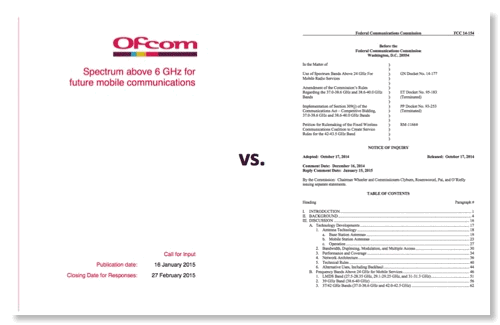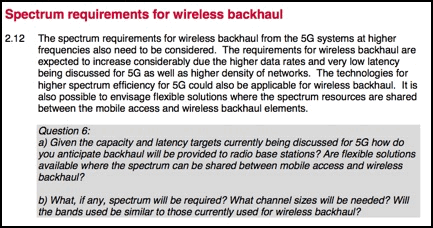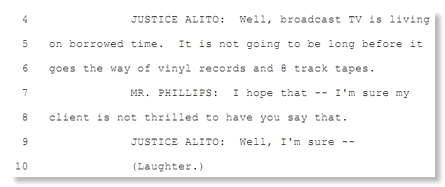Comparing FCC and Ofcom NOI's on MillimeterWave Mobile

On October 17, 2014 FCC released a Notice of Inquiry on “Use of Spectrum Bands Above 24 GHz For Mobile Radio Services”, Docket 14-177. On January 16, 2015 its UK counterpart, Ofcom, released a Call for Input on “Spectrum above 6 GHz for future mobile communications”. These two documents are nearly simultaneous and cover almost the same area. They provide a good opportunity to study differences between FCC and Ofcom and their approaches with dealing with the public in proceedings subject to public comment.
Readers may recall that we have previously commented that FCC’s NOIs and NPRM’s had too many questions and that the questions were poorly organized. We even pointed out that the controversial net neutrality NPRM had a grand total of 345 questions by our count. Did this high number illuminate things and remove ambiguity. I think few would say so.
But in our previous exempts of Ofcom request for comments and Industry Canada requests, we never had a comparison between 2 documents on the same topic that were nearly simultaneous. Now we do!
As we pointed out previously, the FCC NOI has 176 questions scattered throughout the NOI and not numbered in any way. They range from good questions like “To that end, how essential is global harmonization of technical and regulatory requirements to the success of advanced mobile services?” to truly bizarre/voyeuristic questions like “What does industry see as the leading design for ICs that should be used in equipment for frequencies above 24 GHz? “ - exactly what does IC design have to do with spectrum management decisions? But then again, there is the super odd pair of questions: ”What maximum transmit power and/or EIRP limits would be appropriate for mobile services in the mmW bands? Is the +55 dBW EIRP limit currently applicable in the 27.5-28.35 GHz band and 39 GHz band appropriate?” (For non-techies, apparently like the author of this question, “55 dBW” is 316,227 W in more familiar terms. 55 dBW is a reasonable power for a fixed antenna at the top of a tower pointing a narrow beam at another antenna off in the distance, it is an absurd amount of power for a handheld device both in terms of safety to the user and battery power - considering the limited antenna gain possible in a handheld unit. If I worked on the 8th Fl. I would ask how did this crazy question ever get into the NOI where it discredits the FCC as the “expert agency in spectrum management”.)
By contrast, Ofcom only asks 14 questions. They are each repeated twice: first in the context of a discussion on a general topic, and then they are grouped together at the end in Annex 4 on p. 24-25. How civilized! Here is an example of discussion followed by a clear question, readily identified due to its gray brackgound:

OTA DTV Drubbing Continues in SAG Awards
Two weeks ago we reported the dismal showing of over-the-air DTV programming in the Golden Globe Awards - only one award went to OTA DTV and that was to PBS, not a commercial broadcaster. In this week’s Screen Actors Guild (SAG) Awards, at last a commercial network actually won an award! And OTA DTV broadcasters actually won 2 out of 8 award. Clearly a justification for keeping lots of spectrum for TV broadcasting.
Here are the Television winners:
Outstanding Performance by an Ensemble in a Drama Series
"Downton Abbey" - (PBS)
Outstanding Performance by an Ensemble in a Comedy Series
"Orange is the New Black" - (Netflix)
Outstanding Performance by a Male Actor in a Drama Series
Kevin Spacey - "House of Cards" - (Netflix)
Outstanding Performance by a Female Actor in a Drama Series
Viola Davis - "How to Get Away with Murder" - (ABC)
Outstanding Performance by a Male Actor in a Comedy Series
William H. Macy - "Shameless" - (Showtime)
Outstanding Performance by a Female Actor in a Comedy Series
Uzo Aduba - "Orange is the New Black" - (Netflix)
Outstanding Performance by a Male Actor in a Television Movie or Miniseries
Mark Ruffalo - "The Normal Heart" - (HBO)
Outstanding Performance by a Female Actor in a Television Movie or Miniseries
Frances McDormand - "Olive Kitteridge" - (HBO)
Mobile Future Filing Highlights FCC's Real Throughput Limit & Its Impact
Who is Mobile Future? Here is their own description:
Mobile Future is an association of cutting-edge technology and communications companies and a diverse group of non-profit organizations, working to support an environment which encourages investment and innovation in the dynamic wireless sector. Our mission is to help inform and educate the public and key decision makers in business and government on the broad range of wireless innovations that are transforming our society and the nation’s economy.
The list of members includes big players such as AT&T, Verizon, Alcatel-Lucent, Cisco, Ericsson, Samsung, and Qualcomm as well as some obscure non-profits, e.g. Foundation for Advancing Alcohol responsibility and Hispanic Chamber of Commerce of Minnesota. Your blogger is actually a volunteer for one of the nonprofit that is an MF member and has absolutely no idea why this organization is interested in mobile spectrum and involved in this lobbying effort except if one of its board members is with the same PR firm MF uses.
MF describes their comments on their website as “Today, Mobile Future submitted comments to the FCC regarding the potential for providing mobile service using spectrum bands above 24 GHz. As consumer demand for wireless continues to skyrocket, the mobile community is exploring ways to unlock additional spectrum resources.”
http://apps.fcc.gov/ecfs/document/view?id=60001013705
Another Obnoxious Use for Cellphones: Smartphone Use in Movie Theatres

Textual healing
Roger from Great Falls, Va., said that a new year is a good time to remind people not to look at their cellphones during movies. “Taped requests prior to the movie are useless since the offenders already have their faces buried in their screens at the time,” he wrote. “A crowded theater looks like a flock of fireflies just from the LED lights, as emails are checked throughout the movie.”
Sure, Roger, I’ll mention it, but I don’t think it will do much good.
I’ve written about this in the past. Back then, I didn’t think theaters were quick enough to add admonitions against cellphones before the movie started. To their credit, they finally did. Then there was a period when people seemed to sort of get that it was rude to text during a movie.
But now we’ve emerged out the other end, into a time when cellphones are so ubiquitous that half the people who look at them during movies probably aren’t even aware of it. People don’t stop texting when they’re hurtling down the interstate. Why would they stop when in a movie theater?
Roger wrote: “I’d bet that a theater that can block signals would be a big draw. Heck I’d pay a premium for that. In the meantime it looks like Redbox is the only option.”
Theater owners hate to hear that. But they don’t seem willing to invest in the bodies that would stop texting, like an usher at the back of each auditorium looking for cellphone scofflaws.
My only suggestion is to patronize theaters unlikely to attract texters. I think I’ve seen a cellphone out at the AFI Silver only once. The Landmark cinemas on E Street and in Bethesda are great because their auditoriums are underground, unable to be penetrated by cellphone signals.
Of course, they tend to show small, independent films, so if you want to see a blockbuster you may have to sit in the front row, where you’re sure to have only one glowing screen in front of you.
Of course, this is not the first time this problem has been recognized in the blogosphere: National Review, Screen Rant, Today Show. There is even a post in the Houston Press blog advocating more cell phone use in theaters - another reason not to move to Ted Cruz ’s and Rick Perry’s Texas where the theatre patron next to you may well also be armed.
While the cellular industry demands the focused attention of the spectrum policy community on their ever growing spectrum needs, where do they stand on this issue? I can find nothing relevant on CTIA’s voluminous website. Indeed, the industry is silent on many unintended impacts of their technology except to occasionally deny them.
But why can’t the cell industry both ask for more spectrum and try to clean up some of the problems it has created? Maybe the solution is technical, maybe it is better user education, but why not at least try and heed the advice of the Don Norman report?
2015 Golden Globe Awards Illustrate the Continuing Decline of Over-the-Air TV
Notice something spectrum-related in last night’s Golden Globe awards? All the commercial over-the-air (OTA) TV broadcasters got skunked! The only OTA channel/network that got an award was PBS for Downton Abbey .
PRIME-TIME TELEVISION
Drama
The Winner: The Affair - Showtime
Actor, drama series
Winner: Kevin Spacey, House of Cards - Netflix
Actress, drama series
Winner: Ruth Wilson, The Affair - Showtime
Comedy
Winner: Transparent - Amazon
Actor, comedy series
Winner: Jeffrey Tambor, Transparent - Amazon
Actress, comedy series
Winner: Gina Rodriguez, Jane the Virgin - The CW
Miniseries or TV movie
Winner: Fargo - FX
Actor, miniseries or TV movie
Winner: Billy Bob Thornton, Fargo - FX
Supporting actor, series, miniseries or TV movie
Winner: Matt Bomer, The Normal Heart - HBO
Actress, miniseries or TV movie
Winner: Maggie Gyllenhaal, The Honorable Woman - SundanceTV
Supporting actress, series, miniseries or TV movie
Winner: Joanne Froggatt, Downton Abbey - PBS
So as the TV broadcast establishment thinks the solution to their problems is giving away free TV antennas to wean people from nonspectrum alternatives, maybe when they gather in Las Vegas in April for the annual NAB Show, which all FCC commissioners must attend (just like for CTIA) and genuflect at, they should discuss if they really have a product that the public wants to view? Or perhaps in this day and age they should consider the Incentive Auction as a positive option? Maybe they should heed the advice of Justice Alito -- who has life tenure and doesn’t have to be as obsequious as FCC commissioners and members of Congress:






![Validate my RSS feed [Valid RSS]](valid-rss-rogers.png)

